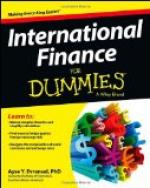Cash in hand and
at Bank of England L12,500,000
Cash at call and
short notice 13,000,000
Bills discounted 19,000,000
Govt. Securities 5,000,000
Other Investments 4,500,000
Advances and loans 42,000,000
Liability of customers
on account of
Acceptances 6,000,000
Promises 2,000,000
-----------
L104,000,000
-----------
On one side are the sums that the bank has received, in the shape of capital subscribed, from its shareholders, and in the shape of deposits from its customers, including Dr. Pillman and thousands like him; on the other the cash that it holds, in coin, notes and credit at the Bank of England, its cash lent at call or short notice to bill brokers (of whom more anon) and the Stock Exchange, the bills of exchange that it holds, its investments in British Government and other stocks, and the big item of loans and advances, through which it finances industry and commerce at home. It should be noted that the entry on the left side of the balance sheet, “Acceptances,” refers to bills of exchange which the bank has accepted for merchants and manufacturers who are importing goods and raw material, and have instructed the foreign exporters to draw bills on their bankers. As these merchants and manufacturers are responsible to the bank for meeting the bills when they fall due, the acceptance item is balanced by an exactly equivalent entry on the other side, showing this liability of customers as an asset in the bank’s favour.
This business of acceptance is done not only by the great banks, but also by a number of private firms with connections in foreign countries, and at home, through which they place their names and credit at the disposal of people less eminent for wealth and position, who pay them a commission for the use of them.
Other wheels in London’s credit machinery are the London offices of colonial and foreign banks, and the bill brokers or discount houses which deal in bills of exchange and constitute the discount market. Thus we see that there is in London a highly specialized and elaborate machinery for making and dealing in these bills, which are the currency of international trade. Let us recapitulate the history of the bill and see the part contributed to its career by each wheel in the machine. We imagined a bill drawn by an Argentine seller against a cargo of wheat shipped to an English merchant. The bill will be drawn on a London accepting house, to whom the English merchant is liable for its due payment. The Argentine merchant, having drawn the bill, sells it to the Buenos Ayres branch of a South American bank, formed with English capital, and having its head office in London. It is shipped to London, to the head office of the South American bank, which presents it for acceptance to the accepting house




